March 13, 2020
Air Date: March 13, 2020
FULL SHOW
SEGMENTS
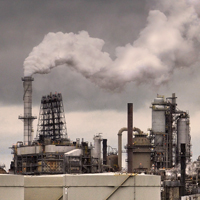
Cheap Oil and the Climate
View the page for this story
Amid the turmoil of the novel corona virus pandemic, oil prices recently had the largest one-day plunge since 1991, with major implications for the shale industry and workers, the climate and national security. Lorne Stockman, senior analyst at Oil Change International, joins Host Steve Curwood to discuss how a Green New Deal framework with clean energy could reduce the impact of the boom-bust oil price cycle. (09:01)

Beyond the Headlines
/ Peter DykstraView the page for this story
For this week's trip beyond the headlines, Environmental Health News Editor Peter Dykstra and Host Steve Curwood look at the massive liabilities that Bayer is facing now that it owns Monsanto, maker of Roundup. Then, the two look at an unintended consequence of the coronavirus: a drop in carbon emissions. Finally, a look back through the history books to a moment that led to the famous Scopes Monkey Trial on evolution. (04:31)
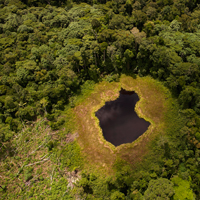
Court Blocks Drilling in the Amazon
View the page for this story
A proposed oil drilling project in the Peruvian Amazon threatened to damage the ecosystem that isolated indigenous peoples there depend on. So an indigenous coalition went to court to try to block the project, and they recently won their lawsuit. Beatriz Huertas, an anthropologist for Rainforest Foundation Norway, spoke with Living on Earth’s Bobby Bascomb about the dangers faced by isolated indigenous communities in the Amazon and what this case means for indigenous communities in the future. (06:35)

Trump EPA Races to Finish Rollbacks
View the page for this story
The Trump administration is rushing to wrap up its weakening of environmental rules, just in case the Republicans lose the White House, or Senate, or both. But rollbacks of Obama administration methane regulations and auto efficiency standards are proving difficult to justify on a scientific basis. Jody Freeman, a Professor at Harvard Law School, joins Host Steve Curwood to discuss the significance of the greenhouse gas regulations and how a new administration could usher in a new era of climate policy. (11:41)
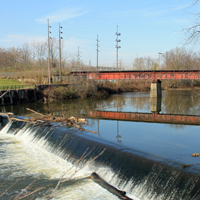
Removing Dams in the Ohio River Watershed
/ Julie GrantView the page for this story
Hundreds of thousands of small dams dot the rivers of the United States, and now that many are no longer economically useful, some are being removed in an effort to protect fish and riverine ecosystems. Julie Grant of the Allegheny Front reports on a dam removal project in the Ohio River watershed. (07:23)

Finding a Rare Mouse-Deer
/ Aynsley O'NeillView the page for this story
The forests of coastal Vietnam are among the most biodiverse on Earth, but in the face of rampant poaching, species are winking out. Recently conservationists got some good news as a species feared extinct, the Vietnamese fanged mouse-deer, was documented for the first time in more than 30 years. Andrew Tilker of Global Wildlife Conservation spoke with Living on Earth’s Aynsley O’Neill about how local knowledge helped locate the rare and tiny mouse-deer, also known as the Silver-backed Chevrotain. (07:17)
Show Credits and Funders
Show Transcript
HOSTS: Steve Curwood
GUESTS: Jody Freeman, Beatriz Huertas, Lorne Stockman, Andrew Tilker
REPORTERS: Peter Dykstra, Julie Grant
[THEME]
CURWOOD: From PRX – this is Living On Earth.
[THEME]
CURWOOD: I’m Steve Curwood.
With re-election in the balance the Trump Administration is racing to lock in rules that ease restrictions on methane leaks, auto efficiency, and more.
FREEMAN: This administration has been committed to an agenda of deregulation, and nearly 100 rules have either been rolled back or are in process. So, this last group that they're trying to get over the finish line, it's really a part of a much larger agenda.
CURWOOD: Also, the human and wildlife benefits of taking down old unused dams.
HENRY: And pretty soon you have people kayaking and paddling and canoeing on these rivers. As people are using the rivers and making stops along the way to dine and shop so the community and the river start tying together so it does promote economic vitality.
CURWOOD: That and more this week on Living on Earth – Stick Around!
[NEWSBREAK MUSIC: Boards Of Canada “Zoetrope” from “In A Beautiful Place Out In The Country” (Warp Records 2000)]
Cheap Oil and the Climate

The crude oil price drop will likely lead to consolidation of oil companies. Pictured is an ExxonMobil facility near Chicago. (Photo: Richard Hurd, Flickr, CC BY 2.0)
CURWOOD: From PRX and the Jennifer and Ted Stanley Studios at the University of Massachusetts Boston, this is Living on Earth. I’m Steve Curwood.
Amid all the turmoil related to the novel corona virus pandemic, the price of oil has crashed from over 50 dollars a barrel in the last week of February down to around 30 dollars most recently. And this has profound implications for the environment, US national security and the economy. The US is now the world’s biggest producer of oil, thanks to hydraulic fracturing or fracking from oil shale, but it’s hard for fracking companies to make money under 50 dollars a barrel. So, a wave of bankruptcies and layoffs for the US fracking industry seems likely, and America’s strategic freedom from foreign oil could be in jeopardy as well. But Saudi Arabia and Russia can afford to pump oil for less. And now by having a price war they can block US competition and get their own reserves out of the ground, ahead of an expected wave of rules and carbon taxes to protect a livable climate. In the meantime, cheap oil also discourages the transition to renewables. For more we turn to Lorne Stockman, a senior research analyst at Oil Change International. Welcome back to Living on Earth Lorne!
STOCKMAN: Thank you. It's good to be here.
CURWOOD: So your expertise in part is looking at the shale petroleum extraction, fracking, it's often called here. How do low oil prices affect the continued shale extraction here in the US?
STOCKMAN: Well, obviously they're not great for shale operators' profitability and the shale sector has been going through relatively hard times in the last few months as the growth in oil demand has been slowing down. But with the crash that's just happened, it does put a lot of shale operators into the red, and the current oil price is generally below the break even oil price needed for them to drill new wells and bring new production online.
CURWOOD: With these low oil prices, who are the winners and who are the losers, keeping the US shale oil extraction in mind.
STOCKMAN: Generally speaking, what they call the independents, you know, the American oil producing companies that are primarily focused on just producing oil in the United States and they're not integrated, like the majors, they don't own refineries, etc. Those companies are going to be hurting pretty bad from this. And there's no doubt we're going to see companies go on to file for bankruptcy. But it remains to be seen whether this is really sort of the end of growth in the shale patch, which some people are saying. Because, you know, what generally happens is we see a certain amount of consolidation, we see the assets of bankrupt companies get sold cheaply and bought up by the better capitalized companies. And we see the resources sort of being concentrated in fewer hands.
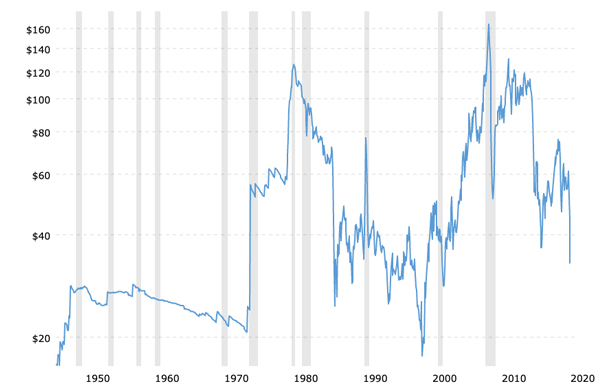
West Texas Intermediate crude oil prices per barrel over the last 70 years. The dip on the right marks the latest price drop. (Photo: Macrotrends.net)
CURWOOD: Sounds like you're forecasting a lot of turmoil then in the fracking business here in the United States, trouble for the companies. What about the people who work for these fracking companies?
STOCKMAN: Right? I mean, they're the real losers here. And you know, we're going to see layoffs. We're going to see You know everything from truck drivers to the roughnecks at well pads, drilling sites all across the board in the shale producing regions, whether that's Texas, New Mexico, North Dakota, there are going to be job losses. We're seeing calls from the industry for some kind of bailout from the Trump administration. And it remains to be seen what would happen there, but you know, I would say we need to see support for the workers over the shareholders of these companies.
CURWOOD: Now, how might this drop in the oil price effect the transition to clean energy here in the United States and worldwide?
STOCKMAN: The price of oil being low, as low as it is today, is obviously bad for the transition to clean energy because those polluting fossil fuels, oil and gas, are cheaper today than they were last year. And that constitutes competition for clean energy technologies that we're trying to transition to. I think how governments could take this opportunity to accelerate a clean energy transition is by following the kind of policies that are being recommended in the Green New Deal, as we see in Europe, or what's been proposed in the United States. And that comes back, you know, that particularly comes back to the workers. We should be supporting those workers over the oil corporations and supporting their transition to cleaner sectors of the economy and new sectors of the economy.
CURWOOD: Talk to me about the impact of this huge drop in the price of oil in the short term versus the long term.
STOCKMAN: So you know, in the short term, there's going to be layoffs, there's going to be less drilling, there's going to be less activity. But the direct impact of that slowdown is in fact, potentially an easing of the supply glut that's been caused by both U.S. shale drilling and Saudi Arabia and Russia's action and consequent rise in oil prices, which then can trigger more drilling. Of course, by then there may be less players in the market. So, you know longer term, unless we see concerted effort to transition away from these polluting sources, we could, you know, be back into the boom part of the boom bust cycle within a year or more depending on what happens externally with the virus and global demand.
CURWOOD: What's the impact of the oil and gas fracking industry on the environment?
STOCKMAN: Well, many and varied. I mean, you know, the local impacts are extreme. I was in the Permian Basin in Texas, New Mexico, which is, you know, the hottest shale play in recent years, in November of last year, and you wouldn't believe what you see as you drive around there. We saw oil wells on fire. We saw gas flares everywhere. We see, you know, a landscape completely littered with oil rigs and pipelines and construction equipment, and roads completely choked up with heavy truck traffic. But that's locally. Globally, we've seen the U.S. literally pushing oil and gas into global markets and crashing the price of both of those commodities globally. And that's making the transition to clean energy much more difficult globally. It's very difficult to transition away from something, the production of which is continuing to grow and the price of which is constantly coming down.
CURWOOD: So what do you think it would take to disrupt the U.S. fracking industry?
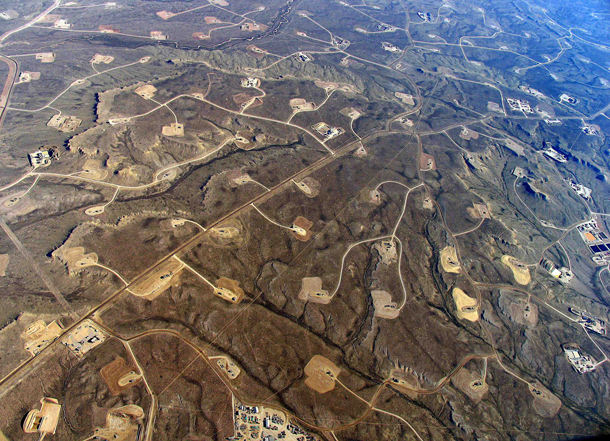
The United States has increased its production of oil in the last decade, but the recent sudden and deep drop in oil prices poses risks to the industry. Pictured is Jonah Field oil & gas facility in Wyoming. (Photo: Bruce Gordon, Flickr, CC BY 2.0)
STOCKMAN: Eventually, we're going to come to grips with the climate crisis, right, and we have this choice of either continuing to dig the hole deeper and continuing to drill for more oil and gas, in which case, you know, when climate policy kicks in and demand drops, we have this economic crisis. Or we have this choice of managing that decline and implementing the kinds of policies that were that we've seen proposed in the Green New Deal. You know, you can look at what's happening today, we see producers battling for market share. That's what's going on. Right. And we're seeing the higher cost producers take a hit as the lower cost producers battle for market share. That's a window on what will happen again, in the future, if we don't manage the decline of oil and gas in this country.
CURWOOD: How does this drop in the price of oil and the impact on the fracking, the shale oil business, affect the worldview of many in this country about the strategic need for oil reserves? In other words, how does this fit into the discussion on national security?
STOCKMAN: Well, that's a very interesting question. I mean, on the whole, the U.S. has been using the oil boom as a sort of weapon, if you like, to decrease reliance on other oil exporters, and that's been seen as a positive thing for national security. Now, of course, in this situation, we start to see how vulnerable the U.S. economy is to being so dependent on U.S. oil and gas production and exports. In other words, you know, simply by producing more oil and not actually reducing our dependence on using oil, that national security benefit is blunted. And so now we're going to see economic impact, particularly in those states, and you know, the U.S. has a more diversified economy than other big oil producers, but still, in those states where the oil and gas is produced North Dakota, New Mexico, Texas, Colorado, etc. Pennsylvania. These impacts, economic impacts, will be very real and this growing dependence on oil and gas money will possibly now be seen as a threat to economic security. I very much see this as a preview of to what might happen in a world actually grappling with the climate crisis and doing something about it. And I think that is, you know, part of what's informing what Saudi Arabia and Russia and other OPEC producers are doing today. They see that there's way more supply of oil and gas in the world than demand can soak up. They see demand growth slowing. They see countries in Europe and elsewhere actually setting deadlines on when they will stop selling vehicles using gasoline and diesel. And the pressure is on. So you know, I think that does play a part in informing the move that's been made by these players. And I think there'll be more to come as things unfold in the coming decade.
CURWOOD: Lorne Stockman is a senior research analyst at Oil Change International. Lorne, thanks so much for taking the time with us today.
STOCKMAN: Thank you very much.
Related links:
- More on Oil Change International
- The New York Times | “Saudi Price Cut is a Market Shock with Wide Tremors”
[MUSIC: Billy Childs Ensemble, “American Landscape” on Lyric, by Billy Childs, Lunacy Music]
Beyond the Headlines
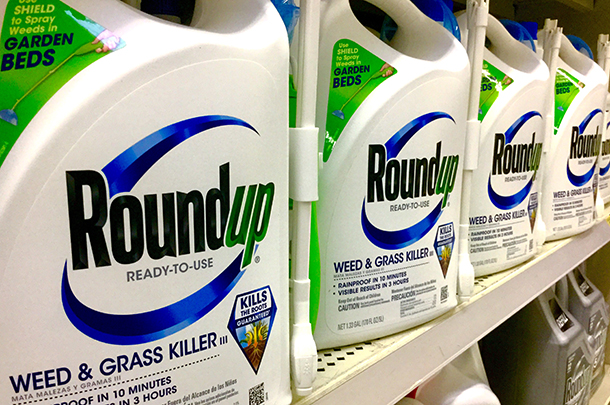
Monsanto’s best known product, Roundup, is associated with thousands of court cases alleging the herbicide’s key ingredient, glyphosate, is associated with the plaintiffs' cancer diagnoses. (Photo: Mike Mozart, Flickr, CC BY 2.0)
CURWOOD: On the line now with me from Atlanta, Georgia is Peter Dykstra. Peter's an editor with Environmental Health News, that's EHN.org and DailyClimate.org. Hey Peter, what do you have for us this week?
DYKSTRA: Well, there's a company that's known mostly in this country for aspirin that has a big headache. That's Bayer, the German multinational. A couple of years ago, they took over Monsanto, the St. Louis-based chemical giant. $63 billion was the cost of the takeover. They thought they were sitting pretty with a product like Roundup, the supposedly safe herbicide. Farms bought it, institutions bought it, landscapers, land owners. But then some studies came out linking glyphosate, Roundup's key ingredient, potentially to cancer. That prompted lawsuits. There were a few huge victories where juries awarded glyphosate victims tens of millions of dollars, and that opened the floodgates.
CURWOOD: Yeah, I think even now you can watch late-night television and see ads from lawyers that say, hey, if you were exposed to Roundup and you have cancer, give us a call.
DYKSTRA: That's right. But Bayer got hit really hard in ways it didn't expect. There are now 48,000 Roundup plaintiffs, either in individual suits or class action suits. Wall Street analysts say Bayer could be facing up to $10 billion in payouts and their stock is down by 31%. The CEO of Bayer has announced his resignation. He'll be leaving next month.
CURWOOD: Okay, Peter, what else do you have for us this week?
DYKSTRA: A little story about unintended consequences. The novel coronavirus could lead to a halt in the growth of greenhouse gas emissions. Emissions are already way down in China. And the plummeting stock prices around the world reflect a drop in demand, and oil and gas stocks taking it on the chin.
CURWOOD: Well, some places are almost in a complete shutdown. Try Italy for example.

Several governments, including the European Union and the United States, have temporarily halted their "ghost flight" rule during the coronavirus pandemic. (Photo: Philip Morris, Flickr, CC BY-ND 2.0)
DYKSTRA: Yeah, the shut down means no air travel, restricted car travel. Some airlines have already reported a 70% drop in booked flights. And that, of course, is going to hit the bottom line for airlines. And here's one little side note. There's something called ghost flights within the airline industry. In many countries around the world, there are prized landing and takeoff slots that airlines will just fight tooth and nail to keep. If they don't fly those slots, due to reduce demand, they could lose them under current rules. So several airlines are flying ghost flights, empty planes carrying no passengers from city to city, just so they don't lose their takeoff and landing rights.
CURWOOD: Well, that won't help the carbon situation though, huh?
BASCOMB: It makes a carbon footprint without actually walking anywhere.
CURWOOD: But surely people are coming to their senses about this.
DYKSTRA: Yes and midweek both the EU and the US announced that they're suspending the rule, so that airlines won't have to make the ghost flights to keep their landings spots.
CURWOOD: All right, Peter. Now's the moment that we take a look back at history and I want you to tell me what you see.
DYKSTRA: Something that happened 95 years ago, Steve, you and I remember it well. March 13, 1925, the Tennessee legislature passed the Butler Act. It made teaching evolution a misdemeanor crime, imposed fines for anyone who taught evolution in any public school or college in the state of Tennessee. Only six of the state's 30 senators gave the measure an opposable thumbs down.
CURWOOD: Oh, Peter. Hey, so what happened after that?
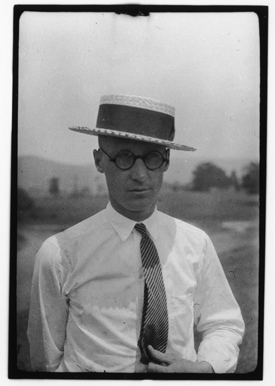
John T. Scopes, a month before being put on trial for the crime of teaching evolution in public schools. (Photo: Watson Davis, Smithsonian Institution, Flickr, Public Domain)
DYKSTRA: Well, the law took effect six days after it was passed. And in May, advocates of teaching evolution recruited a substitute teacher named John Scopes to teach evolution at the high school in Dayton, Tennessee. He was immediately arrested, later convicted under the law in the famous Scopes Monkey Trial. His token fine was reversed later on. But the Butler Act stayed on the books in Tennessee for over 40 years. It was finally repealed in 1967. A year after that, in '68, the United States Supreme Court declared all such laws to be unconstitutional.
CURWOOD: I wish there were a law against monkey business overall in our government operations. Thanks, Peter. Peter Dykstra's an editor with Environmental Health News, that's EHN.org and DailyClimate.org. We'll talk to you again real soon.
DYKSTRA: Okay, Steve, thanks a lot. Talk to you soon.
CURWOOD: And there's more on these stories at the Living on Earth website, LOE.org.
Related links:
- Reuters | “Bayer Chairman Quits as Roundup Settlement Talks Progress”
- The Washington Post | “The Energy 202: Three Charts That Explain What Coronavirus is Doing to Climate Emissions”
- Click here for the History.com article on the Scopes Monkey Trial
[MUSIC: Ray Charles, “What Would I Do Without You?” on Love Songs, by Ray Charles, Atlantic Records]
CURWOOD: Coming up – Uncontacted indigenous tribes in the Peruvian Amazon win court protection from disruptive oil drilling. That’s just ahead on Living on Earth.
ANNOUNCER: Support for Living on Earth comes from Sailors for the Sea and Oceana. Helping boaters race clean, sail green and protect the seas they love. More information at sailors for the sea dot org.
[CUTAWAY MUSIC: Billy Childs Ensemble, “American Landscape” on Lyric, by Billy Childs, Lunacy Music]
Court Blocks Drilling in the Amazon
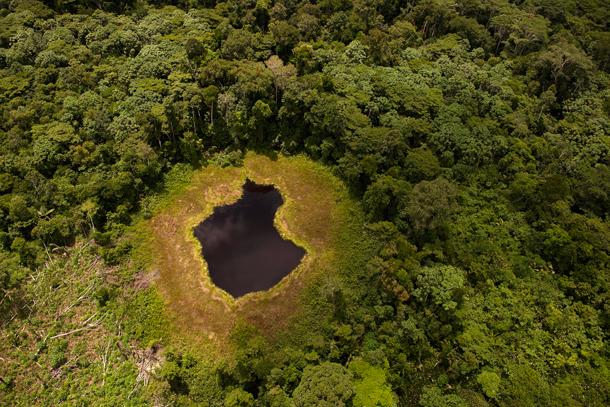
A lake in the Sierra del Divisor National rainforest. (Photo: Thomas J. Muller, El Taller, Flickr, CC by NC 2.0)
CURWOOD: As oil prices plummet it may make less sense to drill for oil in remote or difficult locations like the Amazon rainforest. Take the Sierra del Divisor in the Peruvian Amazon, which was set aside as a national park in 2016. The national oil company, Perupetro, planned to exploit the area for oil extraction until the courts stepped in to rule in favor of an action filed by the Regional Organization of Indigenous People of the East, ORPIO. ORPIO persuaded the judge in the case that uncontacted indigenous tribes living in isolation in the forest would be harmed by oil extraction on their land. For more, Beatriz Huertas, an anthropology consultant with the Rainforest Foundation in Norway spoke with Living on Earth’s Bobby Bascomb.
BASCOMB: So tell me about the Sierra del Divisor National Park where Peru Petro planned to drill for oil. What's special about this park and the people who live there?
HUERTAS: The National Park Sierra del Divisor is one of the most important protected areas in the country. It covers a vast area of the Peruvian Brazilian border. And there's a lot of biodiversity of mammals, including animals like the Jaguar, deer that tapir. There's also a great diversity of primates and birds. The fauna is also extremely diverse and characteristic of the Amazonian region. And this region of Amazonian rainforest is home to indigenous groups living in voluntary isolation. They decided to isolate themselves in order to keep safe from things like disease and aggression, which was brought forth by people exploiting the forest for latex.
BASCOMB: Well, how would the biodiversity of this area be impacted if oil extraction were to go forward?
HUERTAS: So there has already been an impact from the exploration of hydrocarbons. In this specific section of Sierra del Divisor there have been reflection seismology studies already, and the clearing of forests for roadways as wel as installation of heavy equipment. Although in Sierra Divisor, there has only been oil exploration and no oil extraction yet, there is a significant fear that oil spills can happen in this region. In the northern part of the Peruvian jungle, the Selva Norte oil spills happen all the time, causing a lot of contamination in the rivers the land and the surrounding environment. The impacts are quite horrible affecting the flora and the fauna in the forest and killing animals, plants and degrading water resources. For example, there is lot 135. It's located on the edge of the river Yaquerana, and this is an extremely sensitive area. It regulates the flow of the whole river. But that hasn't been taken into consideration by the Peruvian government or considered important when it comes to making decisions about exploiting natural resources in the forest.
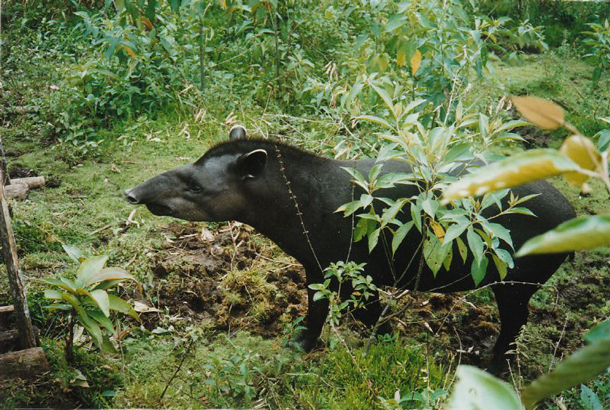
The South American tapir is an endangered species found in the Amazonian rainforest and river basin in South America. (Photo: Elizabeth Prata, Flickr, CC by NC 2.0)
BASCOMB: And what would petroleum extraction mean for the indigenous groups who live in the park?
HUERTAS: Well there is a risk of isolated communities being infected by diseases introduced by oil extraction company workers. That could result in a massive outbreak of deadly illnesses for indigenous people. They don't have immunological defenses, people living in cities and talents have developed throughout the years, and degrading the forest for exploitation would basically damage their main source of subsistence. They don't depend on mass produced agriculture, like people in cities, they basically live off the land.
BASCOMB: Well, that's the thing. I mean, if these are indigenous people living in self imposed isolation and in the forest, they're inherently dependent on a healthy forest for their livelihood for their food, their water, their homes, I mean, everything.
HUERTAS: Exactamente. Yeah, exactly. They depend exclusively on the forest and rivers in Sierra resort to keep them alive. The health of the forest could be considered an indicator of their livelihood.
BASCOMB: So how was an isolated indigenous tribe in the Amazonian rainforest able to organize themselves enough to sue the government and sue Petro Petro successfully in this case, to stop oil extraction in their in their area?

El Cono is a 1,500 foot inactive volcano in Sierra Divisor. (Photo: Diego Perez, Ministerio del Ambiente, Flickr, CC BY NC ND 2.0)
HUERTAS: Well, the indigenous groups in isolation don't really have any social relationship to approve the people. So or if you're the regional organization of indigenous people of the East, they took on the responsibility of defending and protecting these indigenous groups. They presented a lawsuit against the Peruvian government for violating the fundamental rights of health and subsistence of these indigenous groups in isolation. This lawsuit was presented in 2016 and in December of 2019, we obtained a favorable verdict.
BASCOMB: So how then might the ruling in this case, affect indigenous groups going forward and more, you know, oil extraction in indigenous reserves and national parks and things in the future? I mean, it's a very rich area in oil and minerals and all sorts of things that make companies wealthy.
HUERTAS: This ruling is extremely favorable. It's the first ruling of its kind in Peru. The judge said that zoning for oil extraction in Sierra Divisor must be changed to respect the areas inhabited by indigenous groups in isolation, and that permits for oil extraction in these areas should never be granted again. It is creating favorable precedence for the rights of indigenous groups in isolation. This is establishing respect for their subsistence, and livelihood above money and economic interest. But we also have to consider that this is the first ruling so far, and that the defendants in this case have appealed. We have to work very hard and keep fighting in order to obtain the same verdict in the second ruling.
CURWOOD: That’s anthropologist Beatriz Huertas speaking with Living on Earth’s Bobby Bascomb.
Related links:
- Reuters | “Peruvian Indigenous Group Wins Lawsuit Against Oil Exploration”
- The Guardian | “Indigenous Federation Sues Peru Over New National Park”
[MUSIC: Inca Son*, “El Pastor Solitario (The Lonely Shepherd)” on Mi Cambio (My Change), by James Last, Independent]
Trump EPA Races to Finish Rollbacks

EPA regulations can take years to implement, and years to roll back and replace. (Photo: Paul A. Fagan, Flickr, CC BY-NC-ND 2.0)
CURWOOD: As the 2020 general election draws near the Trump administration is rushing to weaken a number of environmental rules, just in case the Republicans lose the White House, or Senate or both. The EPA is now reportedly working under a deadline of May 20th to complete these rollbacks under the assumption that the changes would be protected from summary repeal by a new Democratic majority. The little known the Congressional Review Act allows a simple vote of both houses of congress to revoke any new rules or changes that were adopted in the last 60 legislative days of the previous congress, bypassing the usual and lengthy rulemaking process. When the Trump Administration came to power with Republicans in control of both houses, they used the act to immediately undo 16 Obama-era rules and Democrats could plausibly do so as well if the election turns out in their favor. For more we turn now to Jody Freeman, a professor at Harvard Law School who served as Counselor for Energy and Climate Change in the Obama White House. Jody, welcome to Living on Earth!
FREEMAN: Great to be here, thanks, Steve.
CURWOOD: So let's talk about some of the signature rules that the Trump administration EPA is trying to wrap up before this May deadline.
FREEMAN: Well, there are a few big rules that have to do with climate change in particular, and one that has to do with science that they're really racing to finish, I think. One of them would be to roll back the methane standards that regulate the methane emissions that come from the oil and gas sector. And that's important because these methane leaks are really bad for the climate. This is a very potent greenhouse gas. And the Obama folks put in place standards to control them and the Trump folks want to roll those back. The other big rule that's been very controversial that the administration has been working on for a couple years now is the fuel efficiency and greenhouse gas standards for cars and trucks. That was a pillar of the Obama administration's climate policy and the Trump administration has proposed to freeze those standards in place in a way that will make it very difficult to cut GHGs for the transport sector.
CURWOOD: So just how important are these auto efficiency standards?
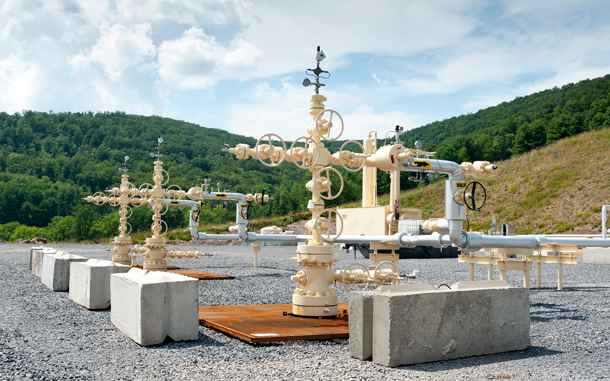
The Trump EPA is seeking to loosen the methane rule put in place by the Obama administration, which would have required leak monitoring and prevention measures at wells, pipelines, and storage facilities like this shale gas facility in Pennsylvania. (Photo: Max Phillips / Jeremy Buckingham MLC, Flickr, CC BY 2.0)
FREEMAN: Yeah, to put these standards in context, let me just give you a picture: of greenhouse gas emissions in the US economy, about 30% come from transport. So it's a big chunk that comes from cars and trucks. And the Obama standards would have kept fuel efficiency improving up to 50 miles per gallon by 2025. And what the Trump administration would do is just lock them in place at the 2020 levels. So that's a loss of improvement of about five years, and it's a really significant chunk of what the US promised to do for the Paris Accord. So this is all part of an agenda that has us really falling short of the US commitment to Paris. And as you know, Steve, the Trump administration announced that they would withdraw from the Paris Agreement. And then they set about eliminating the policies domestically that Obama had put in place to get there. So cutting back these fuel efficiency standards is one of the key prongs of the climate policy that would have gotten the US to reduce emissions to meet its commitment. And the other policy, which the Trump folks have already completed, is to roll back the standards for the power sector, for electricity, that would control CO2 coming from the nation's oldest and dirtiest power plants. And by their own admission, in their own documents, those standards that they've put in place would improve the performance of the electricity sector by just 1%. You know, we'd only be reducing greenhouse gases in the most minimal way. And it would actually increase premature deaths from pollution. That, that's in their own documentation. So what they've done in the power sector is really egregious. And now they're trying to finish the rollback for the transportation standards too.
CURWOOD: You know, my grandmother used to say "haste makes waste." In other words, how airtight is this rulemaking that they're doing, and how vulnerable to legal attack might it be?
FREEMAN: So they've had a lot of trouble finalizing the standards that would block fuel efficiency, that would lock it in place and prevent it from improving, because what they've had to do is try to make an argument that when you keep these standards where they are, it's good for consumers and it's good for the environment. In fact, better fuel efficiency, if it were allowed to rise, would save people money at the pump, it would be good for consumers, and better fuel efficiency standards would reduce pollution. So they're just having trouble justifying the rule. And it's taken them a really long time. And it's hard to believe they're going to finish by the end of May or the beginning of June, which is their target. They're probably vulnerable to a lawsuit on this, because they're going to have a weak record to support it. And courts don't like it when agencies like EPA come in and try to defend deregulation, or regulation for that matter, if they have a very weak justification. And in this case, the administration just cannot make the numbers work.
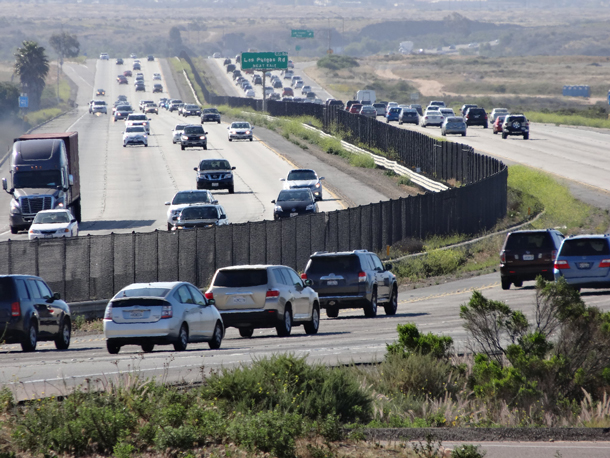
The Trump administration is working on finalizing its freezing of fuel efficiency standards for cars and trucks at the 2020 level. (Photo: Shelton Dunning, Flickr, CC BY 2.0)
CURWOOD: Now let's talk about why May matters; and of course there's an upcoming election as well.
FREEMAN: So the end of May matters because that's the date by which the administration feels if it finishes its regulatory rollbacks, they'll be locked in, and a new Congress couldn't reach back and essentially cancel them out. There's a federal law called the Congressional Review Act, and it allows Congress to look back 60 legislative days, so it's days in which Congress is in session, which really when you count it up can go back as far as about six months, and essentially disapprove final regulations through a fast track process that's filibuster proof. So let's say if, for example, the Democrats were to win the Senate -- it's a big if, but if they were to -- and the presidency, a new administration and a new Congress could reach back at these rules that have been finalized, and, without going through the normal, lengthy legislative process, they can disapprove these rules. So what the Trump administration is trying to do is get these things across the finish line and innoculate them from a new Congress canceling them out.
CURWOOD: Remind us what happened when Mr. Trump came into power and the Congressional Review Act was used.
FREEMAN: So this is a law nobody's ever heard of. And it had only been used once before; it was passed in the 1990s. It was only used once before when George W. Bush came into office, but nobody ever used it much after that. Well, the Trump folks realized this is a very powerful tool, they can reach back at six months or so of Obama regulations, and essentially zero them out. And that's what they did for about 17 regulations Obama had adopted. None of them were EPA rules, but a few of them were Department of the Interior rules. And to put this in context, Steve, you know, this administration for the last few years has been committed to an agenda of deregulation, and they've rolled back by our count, by my program's count at the Harvard Law School where we track these things, nearly 100 rules have either been rolled back or are in process. So this last group that they're trying to get over the finish line, it's really a part of a much larger agenda. And what's so important about this particular tool, this canceling out of regulations, is that the Congressional Review Act is especially powerful and an especially blunt instrument. What it says is, if Congress disapproves the final rule, the agency can never pass one that is substantially the same, they can never adopt a similar rule. And that is a very powerful block on what agencies can do in the future.

United Nations leaders celebrate the adoption of the Paris Agreement on climate change, 12 December 2015. The United States was in a leadership position on the accord until the Trump administration notified the world it would be pulling the U.S. out, and began dismantling climate policies at EPA. (Photo: Mark Garten, United Nations Photo, Flickr CC BY-NC-ND 2.0)
CURWOOD: So here's another hypothetical, that in the election, the Democrats do gain control of the Senate and the White House. How easy or difficult is it going to be for the Democrats if they come into power to undo the so many policies that the Trump administration has pursued at the EPA and elsewhere?
FREEMAN: What's so interesting is, these environmental and public health and climate rollbacks are all happening at the agency level. What that means is, they can mostly be undone. You know, if you issue a rule, you can rescind a rule. So a new administration could replace what the Trump administration has done. They could tighten carbon standards for power plants, they could put back in place the aggressive fuel efficiency standards of the Obama folks, they could basically undo all the unraveling, but it would take time. And that's because these regulations have to go through a process. They have to be transparent, they have to go out for public comment. They have to go to the White House for review. And so the problem is that a new administration that wanted to put back in place the kind of 50 years of environmental protection that the Trump folks have been trying to roll back, it would take them maybe, you know, half of a first administration to get that done.
CURWOOD: So what's your advice to Democrats who may or may not gain control, about starting to work now to do the work to do the legwork and the detail work, so that if they do come into power, come next January that they'll be able to move this agenda forward faster than it ordinarily could be done.
FREEMAN: Well, one thing you have to do is have a real game plan. And the first part of that is to have a very clear sense of exactly what the Trump administration has done to weaken everything from how we handle coal ash from power plants, you know, to their effort to downsize public lands, to their effort to block more efficient lighting, to their cutting back on protections for streams and wetlands. I mean, there is such a long list here. And the key is to have a very clear picture of everything that they have done by rescinding these regulations or weakening regulations. And once you have that sort of map of what they've done, and the stage that they're at, you can basically set in place a process to reverse it. So they have to begin planning essentially now. They have to have a set of new rules ready to go across the federal government at the agencies where those rules have been rescinded or weakened, and thinking through, you know, what do you really want to accomplish on environmental protection, natural resource protection, climate change, what are your priorities, and then appointing the people to those positions who know how to get things done.
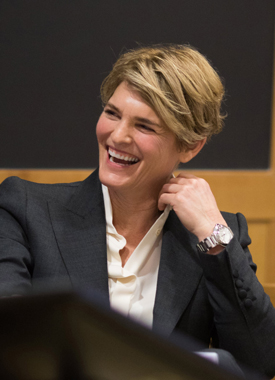
Jody Freeman is the Archibald Cox Professor of Law and the founding director of the Harvard Law School Environmental & Energy Law Program. (Photo: Harvard Law School)
CURWOOD: Jody, before you go, as a former Counselor on Energy and Climate Change at the Obama White House, what do you see as the top priority or top priorities for climate policy on day one, if the Democrats are back in the White House and have some heft in the Senate?
FREEMAN: Yeah, I think day one has to be signaling to the international community that we are back in on dealing with global climate change, we're going to lead again in international negotiations. Because after all, this is a global problem. The Paris Climate accord was a great beginning for a real international solution. So I think a new president has to say, we want to lead again. And then I think they have to say, look, we'd like the Congress to pass a carbon tax or some other policy to put a price on carbon emissions. And there's some support for that in industry; at this moment, I think they realize we need a policy. So I think a carbon tax would have a decent chance of passing. But I think the new president, day one, has to say if Congress isn't going to do anything, I'm prepared to use the laws on the books to do everything I can to reduce greenhouse gas emissions. And meanwhile, I want to protect people from air pollution, water pollution, and all the other things that we've committed to for half a century now. And I think that's a fairly easy set of executive orders to make that new policy clear. And I think any new Democratic president would be committed to do that right away.
CURWOOD: Jody Freeman is a Professor at Harvard Law School and Director of the Energy and Environmental Law Program. Thanks so much for taking the time with us today, Professor.
FREEMAN: Thank you. My pleasure.
Related links:
- The Environmental and Energy Law Program Regulatory Rollback Tracker
- E&E News | “EPA: Wary of Democratic victories, agency rushes to finish rules”
- About Jody Freeman
[MUSIC: The Cocktails, “Gymnopedie No. 1” on Sing Me To Sleep – Indie Lullabies, by Erik Satie, American Laundromat Records]
CURWOOD: Coming up – Scientists discover a small population of Vietnamese fanged mouse deer, a tiny creature not seen in some 30 years. That’s just ahead on Living on Earth.
ANNOUNCER: Funding for Living on Earth comes from you, our listeners, and United Technologies, combining passion for science with engineering to create solutions designed for sustainability in aerospace, building industries, and food refrigeration. UTC companies such as Otis, Carrier, Pratt and Whitney, and UTC Aerospace systems are helping to move the world forward. You can learn more about United Technologies by tuning into the Race to Nine Billion podcast; listen at racetoninebillion.com.
[CUTAWAY MUSIC: Tiger Moth, “Sloe On the Uptake” on The Imagined Village, Traditional English/arr.Ian Anderson, Ben Mandelson, Rod Stradling, Simon Emmerson, Eliza Carthy, Real World Records]
Removing Dams in the Ohio River Watershed
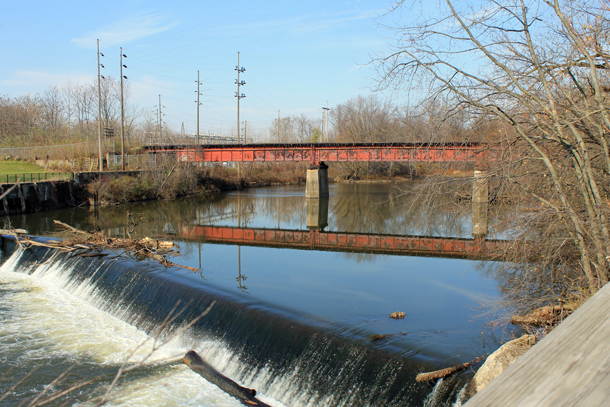
The Summit Street Dam on the Mahoning River. (Photo: Jack Pearce, Flickr, CC BY-SA 2.0)
CURWOOD: It’s Living on Earth, I’m Steve Curwood.
Hundreds of thousands of small dams dot the rivers of the United States. They were once popular for use in grain mills and industry. And Many are no longer needed by people, but they continue to be a barrier to fish and wildlife. On the Mahoning River in Ohio the community of Lowellville is planning to remove a dam on their river but as Allegheny Front’s Julie Grant reports, not everyone is on board with the plan.
GRANT: Growing up in the small Riverfront village of Lowellville, Ohio by the Pennsylvania border, Jim Iudiciani, and he stayed away from the Mahoning river.
IUDICIANI: When I was a kid if I went near that river we get smacked because it was so dirty and dangerous.
GRANT: Now as mayor of Lowellville, he's been pushing for years to get rid of the old steel industry dam, that crosses the river here, and he says it's coming down this summer.
IUDICIANI: On the joking side, they call me the dam mayor and for good reason, finally.
GRANT: Just steps from the village downtown Iudiciani and he stands alongside the river where brush has been cleared for heavy equipment needed to remove the dam, a series of eight low concrete piers that point downstream. It will be the first in a regional plan to remove nine dams along the Mahoning River, which crosses into Pennsylvania and joins the Shenango to form the Beaver River. Right now people who canoe and kayak on the Mahoning need to pull their boats out of the water and carry them around the dam.
IUDICIANI: Where you see all the whiteness underneath. That's just the hydraulics, which makes it very dangerous.
GRANT: Ohio regulators describe these low head dams as drowning machines because canoes and other boats can get trapped in a recirculating current below the dam. Once the Lowellville dam is removed Ludiciani wants his riverfront village to become a hotspot for outdoor recreation. He points out where a new park with space for canoes is planned. He talks about a new restaurant.
IUDICIANI: bicycle shop, kayak rental.
GRANT: a yoga studio and new living space.
IUDICIANI: We're looking at four or five story buildings being built on the river possibly B and Bs and or condos with multi use parking underneath. Yeah, this whole thing is going to be a catalyst for us for development.
GRANT: It's a far cry from the region steelmaking days. But even after most steel mills closed and Ohio EPA survey still found the effects of pollution in the river.
DYER: They found fish with lesions and tumors on them. The macro invertebrate community was poor.
GRANT: That's Stephanie Dyer, environmental program manager for the East Gate Regional Council of governments, the agency leading the Mahoning dam removal project. In the late 1990s, the US Army Corps of Engineers looked into dredging the river to get rid of contaminants especially behind the low head dams. But the Corps never move forward with its river cleanup. Then in the early 2000s in Ohio grant program assisted with dam removals on the nearby Cuyahoga River.
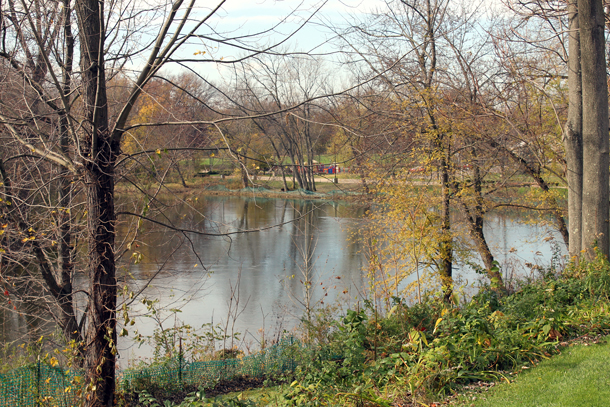
The dams are being removed in the hopes of protecting wildlife, revitalizing the riverine ecosystem, and even promoting tourism. (Photo: Jack Pearce, Flickr, CC BY-SA 2.0)
DYER: And that's when it started to click here at East Gate as well as within the region that we can do this on our own as a local community as a region.
GRANT: According to East Gate, Lowellville and the cities of Struthers and Youngstown have secured more than $10 million to remove five dams with funding from the Ohio EPA and a settlement with LTV Corporation. That's about half of what's needed to remove all nine dams.
DYER: This river built the valley. And so now it's time we all realized which we're doing is giving back to the river and creating the free flowing state it should be in right now.
GRANT: But some communities don't want their dams taken down.
ANTHONY: You know what? We just want to be left alone.
GRANT: Edward Anthony is a trustee for Warren township a rural area 20 miles up river from Lowellville and home of the Leavittsburg dam. Local fire officials here say if their dam is removed, they won't have the pool of water it creates as a secondary source for emergencies. And health officials worry that without the damn water levels will be too low to dilute sewage from home septic systems.
ANTHONY:So it's a grave concern because I think if they proceed with this, they're going to do this and then we're going to be left with a mess.
GRANT: Looking down on the Mahoning at water flowing over the Leavittsburg dam resident Mike Arnold points across the river at what used to be in Ohio Edison facility.
ARNOLD: That's where the power plant set.
GRANT: The concrete dam was built to pool water for the plants but the electric company no longer uses it.
ST. CLAIR: Directly behind that dam is 12 feet.
GRANT: That's Russell St. Clair, who lives along the river which is almost like a lake behind the dam.
ST CLAIR: Just about maybe 400 yards up the river it goes to eight foot. Then it goes to seven foot like behind our house.
GRANT: St. Clair and his neighbor's float on pontoon boats and report seeing bald eagles and river otters. His kids and grandkids fish for muskie and perch.
ST CLAIR: The river now is better than it's ever been. I mean it is.
GRANT: Mike Arnold worries how the dam removal will affect fishing here.
ARNOLD: There's nothing for them to eat, the fish will be gone. They can't survive in that kind of water.
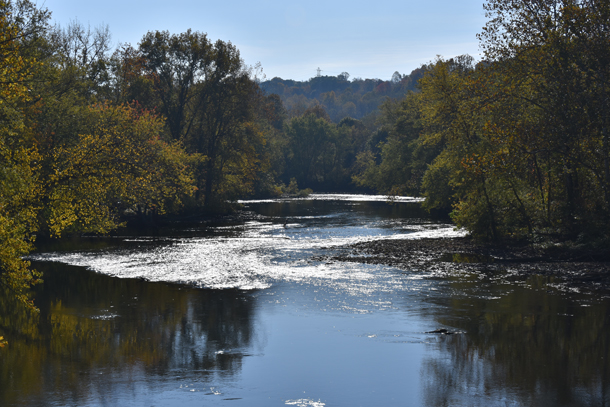
Lowellville in Northeast Ohio is home to the first dam being removed as a part of this project. (Photo: Stephanie Dyer)
GRANT: But in Ohio EPA study in 2006 found that fish communities behind the dam and Leavittsburg and elsewhere along the Mahoning were impaired. And according to East Gate, it's not yet known how the dam removal will change water levels. Ben Lorson wants to calm people's fears. After dams are removed, the same amount of water will still run down the river.
LORSON: And that's not going anywhere that'll always be there.
GRANT: Lorson is a fish passage biologist with the Pennsylvania Fish and Boat Commission. He says removing dams is better for fish.
LORSON: There's kind of this misconception that you know you're taking the good fishing spot away. When in reality those fish want to go upstream. They're just not able to because the dams in their way.
COLLIER: Oftentimes when it comes to aquatic organism passage we like to say if you unbilled it, they will come.
GRANT: Jessica Collier is a fish biologist with the US Fish and Wildlife Service. She says one fish in particular that could return to the Ohio by removing dams in the watershed is the lake sturgeon. These behemoth ancient fish can live up to 150 years. They migrate long distances, sometimes hundreds of miles to spawn. The sturgeon is considered endangered in most states throughout its range. They were over fished their habitat was destroyed and their migration paths were blocked by dams. Collier points to the success of a large dam removal project in the Sandusky river that flows into Lake Erie.
COLLIER: Within a couple months of dam removal there was a sturgeon that migrated up the river and it was the first time a sturgeon had been seen in that river system in maybe a century.
GRANT: And in the Ohio removing dams is bringing back people too according to federal fish biologist Donovan Henry, who coordinates the Ohio River Basin Fish Habitat Partnership.
HENRY: And pretty soon you have people kayaking and paddling and canoeing on these rivers has people using the river or making stops along the way to dine and shop so the community in the river start tying together and it does promote economic vitality.
GRANT: Standing on the banks of the Mahoning Lowellville Mayor, Jim Iudiciani And he wants that future for his village but looking at the river roll over the dam today, he still sees beauty in it.
IUDICIANI: Getting the surreal feeling sad feeling too that now it's coming out we're never going to see this again either, but it needs done. You know
CURWOOD: Reporter Julie Grant’s story comes to us courtesy of the Allegheny Front and is part of the series, Good River, produced by seven nonprofit newsrooms in the Ohio Valley. For a link to the series, go to our website, LOE.org.
Related link:
Listen to this story on the Allegheny Front website
[MUSIC: Michael Johnathon, “Blue Skies” on Legacy, by Irving Berlin, Poet Man Records]
Finding a Rare Mouse-Deer
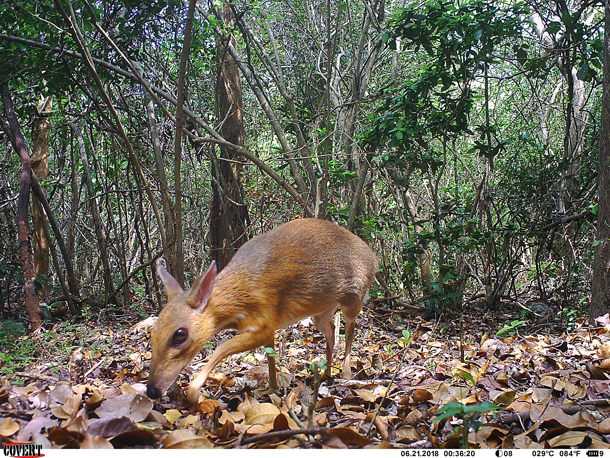
Silver-backed Chevrotain live in the scrubby forests of Vietnam’s coast. (Photo: Courtesy of SIE / GWC / Leibniz-IZW / NCNP)
CURWOOD: When a species hasn’t been seen for years, we start to worry it might be gone forever, just a ghost from a bountiful past. But in the forests of Vietnam, a team of scientists from Global Wildlife Conservation and its partners have caught just such a ghost on camera: The Vietnamese Fanged Mouse-deer. There have been no scientific records of this tiny creature in nearly 30 years, but now, camera traps have identified at least one population of the elusive creature, also known as the Silver-backed Chevrotain. The chevrotain is the first species found as part of Global Wildlife Conservation’s hunt for 25 "Most-wanted" species, which they think, may be lost. But the discovery of this particular species doesn’t necessarily mean that it is safe from extinction. Vietnam has a lot of biodiversity, but it also has huge conservation challenges, including a thriving bush meat trade. For more about the search for the chevrotain, Andrew Tilker, the Asian Species Officer for Global Wildlife Conservation spoke with Living on Earth’s Aynsley O’Neill.
O'NEILL: What does it mean for the silver-backed chevrotain to have been lost to science?
TILKER: So there had been no scientifically validated records, in this case for more than 25 years, and scientists were unsure whether or not it still existed in the wild in Vietnam.
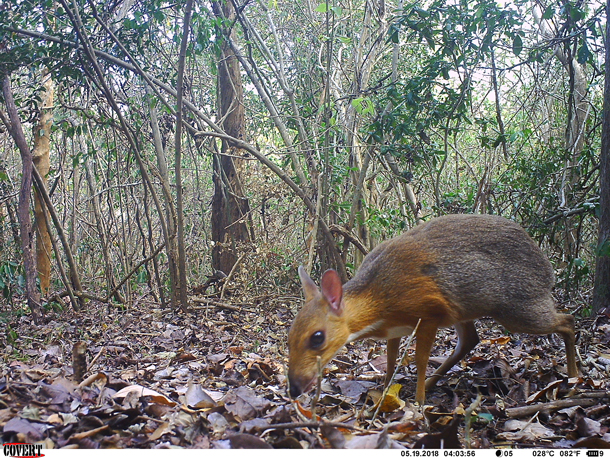
These animals are also known as mouse-deer. They are the world’s smallest ungulates, or hooved animals. (Photo: Courtesy of SIE / GWC / Leibniz-IZW / NCNP)
O'NEILL: Is there any way for us to know why the chevrotain was lost for so long?
TILKER: So the silverback sugarcane was first discovered in the early 1900s. And then after that the species went unrecorded, until 1990. It's only known from a small part of Vietnam. And so it's not very widespread. It really occurs in a sliver of habitat in a small part of a fairly small country.
O'NEILL: And so the first spotting was on these camera traps. And one of the reasons we had to talk about this story is that it is just too cute for words, in my opinion, but how did it feel to see this creature for the first time?
TILKER: It's a really cool animal. So it looks like a tiny deer. And when I say tiny, I mean the size of a rabbit. It looks like a small deer that somebody had dipped halfway into a bucket of silver paint and then pulled it out again. It's a really unique animal. There's nothing else like it. When we got the first photos from the camera traps, I mean, obviously I was overjoyed, as was the entire team. We felt confident that we had a good shot at getting photographs of the species because local people said they saw this animal that couldn't be anything else. But we didn't expect to get so many photos on our first try. So that was really something special. And again, just highlights the importance of I think working with local people and local ecological knowledge.
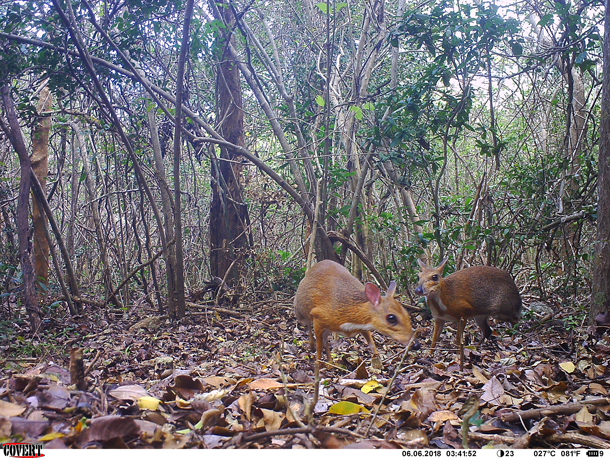
Researchers are still in the early stages of learning about this species, and males and females, young and old, are tough to tell apart. (Photo: Courtesy of SIE / GWC / Leibniz-IZW / NCNP)
O'NEILL: Did local people know about the chevrotain, and, are there any other similar species that they might see and think oh, that's a silverback chevrotain.
TILKER: So, local people were familiar with the silver-backed chevrotain. And they could clearly distinguish it from the more common, lesser chevrotain. And that's actually how we found the species. We conducted interview surveys across several provinces in Vietnam, talking to local people who spent a lot of time in the forest. And in two different locations, local people told us they had seen a gray colored chevrotain. And so we went to one of these locations and put out camera traps and obtained the first photos of the species and the first record that the species exists in almost 30 years. So the species wasn't lost to local people, which is why we try to be very careful to say that silverbacked chevrotain was lost to science.
O'NEILL: Now, is there a threat that is unique to the show retain that might have led to its rarity? Or would you say that this is a larger issue of conservation in the world in Southeast Asia, in Vietnam specifically?
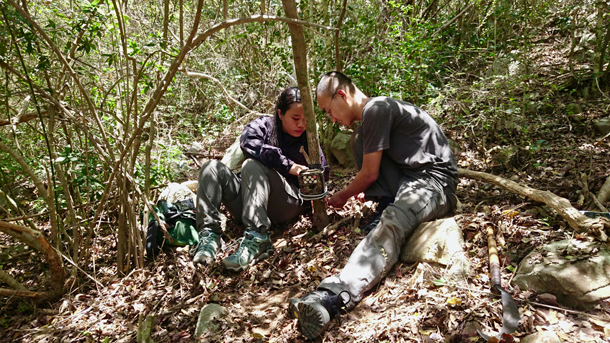
A pair of researchers set up camera traps in order to photograph the elusive chevrotain. (Photo: Courtesy of SIE / GWC / Leibniz-IZW / NCNP)
TILKER: We don't yet know if there are threats that are specific to the chevrotain. But the species is, without a doubt heavily threatened by rampant indiscriminate snaring because every mammal species in Vietnam is threatened by snaring. In Vietnam and in other parts of Southeast Asia, bushmeat is something of a status symbol. So if you're upper middle class and you want to show off to your friends, an easy way to do that is to go out and go to a bushmeat market and buy bushmeat rather than domestic meat. So it really is this I've heard people call it luxury meat kind of industry in Vietnam, that is fueling the snaring crisis that is catching chevrotain and many other species. We're very intentionally not releasing the name of that site or the location of that site, just to be sure that there is no chance that any poachers who want something different or novel would try to hunt animals from that population. We know that the species is threatened by poaching, there's no question about it. The question is, how severe is that threat? Is it pushing the species to extinction? Or do we still have a small window of time?
O'NEILL: What are the next steps? Where do we go from here?
TILKER: So the work is just beginning. The first step is securing the single known population. The second step, I think, is try to figure out where else the species occurs. If we lose these species from Vietnam, because they're only found in this country, then that equates to global extinction. We don't have backup populations as far as we know. That's it.

Eric Losh’s artistic rendering of the silver-backed chevrotain. (Photo: Courtesy of SIE / GWC / Leibniz-IZW / NCNP)
O'NEILL: What do you think is so important about telling the story of the silver-backed chevrotain?
TILKER: I think I like the fact that we're able to tell a very positive story about Vietnam, which has incredible biodiversity and is losing that biodiversity at an unsustainable rate. So the fact that we're able to tell a positive story, I think, gives much needed momentum for a positive outlook to conservation in Vietnam. And I've seen that in my interactions with local stakeholders, both from NGOs and also from the Vietnamese government. So it's it's nice to be part of a story that has such a positive direction because I think that's often needed when you're working in such a difficult field.
CURWOOD: Andrew Tilker, the Asian Species Officer for Global Wildlife Conservation speaking with living on Earth’s Aynsley O’Neill.
Related links:
- Read more about the search for the chevrotain
- Click here to learn about Global Wildlife Conservations search for lost species
- The New York Times | Vietnam’s Empty Forests
- VIDEO: A Chevrotain prances in the nighttime forest of Vietnam
- VIDEO: A Chevrotain forages, and looks out for danger, it’s tough to be a little guy!
- VIDEO: Watch as a chevrotain searches the forest floor, what’s he, or she, looking for?
[MUSIC: Taj Mahal, “When I Feel the Sea Beneath My Soul” on World Music, by Taj Mahal, Sony Music Entertainment]
CURWOOD: Living on Earth is produced by the World Media Foundation.
Our crew includes Naomi Arenberg, Bobby Bascomb, Paloma Beltran, Thurston Briscoe, Jenni Doering, Jay Feinstein, Merlin Haxhiymeri, Don Lyman, Isaac Merson, Aynsley O’Neill, Jake Rego, Candice Siyun Ji, and Jolanda Omari.
And today we bid a fond farewell to intern Anna Saldinger. Tom Tiger engineered our show. Alison Lirish Dean composed our themes. You can hear us anytime at L-O-E dot org, iTunes and Google play- and like us, please, on our Facebook page - Living on Earth. We tweet from @livingonearth. And find us on Instagram at livingonearthradio. I’m Steve Curwood. Thanks for listening!
ANNOUNCER: Funding for Living on Earth comes from you, our listeners, and from the University of Massachusetts, Boston, in association with its School for the Environment, developing the next generation of environmental leaders. And from the Grantham Foundation for the protection of the environment, supporting strategic communications and collaboration in solving the world’s most pressing environmental problems. Support also comes from the Energy Foundation, serving the public interest by helping to build a strong, clean, energy economy.
ANNOUNCER 2: PRX.
Living on Earth wants to hear from you!
Living on Earth
62 Calef Highway, Suite 212
Lee, NH 03861
Telephone: 617-287-4121
E-mail: comments@loe.org
Newsletter [Click here]
Donate to Living on Earth!
Living on Earth is an independent media program and relies entirely on contributions from listeners and institutions supporting public service. Please donate now to preserve an independent environmental voice.
NewsletterLiving on Earth offers a weekly delivery of the show's rundown to your mailbox. Sign up for our newsletter today!
 Sailors For The Sea: Be the change you want to sea.
Sailors For The Sea: Be the change you want to sea.
 The Grantham Foundation for the Protection of the Environment: Committed to protecting and improving the health of the global environment.
The Grantham Foundation for the Protection of the Environment: Committed to protecting and improving the health of the global environment.
 Contribute to Living on Earth and receive, as our gift to you, an archival print of one of Mark Seth Lender's extraordinary wildlife photographs. Follow the link to see Mark's current collection of photographs.
Contribute to Living on Earth and receive, as our gift to you, an archival print of one of Mark Seth Lender's extraordinary wildlife photographs. Follow the link to see Mark's current collection of photographs.
 Buy a signed copy of Mark Seth Lender's book Smeagull the Seagull & support Living on Earth
Buy a signed copy of Mark Seth Lender's book Smeagull the Seagull & support Living on Earth

